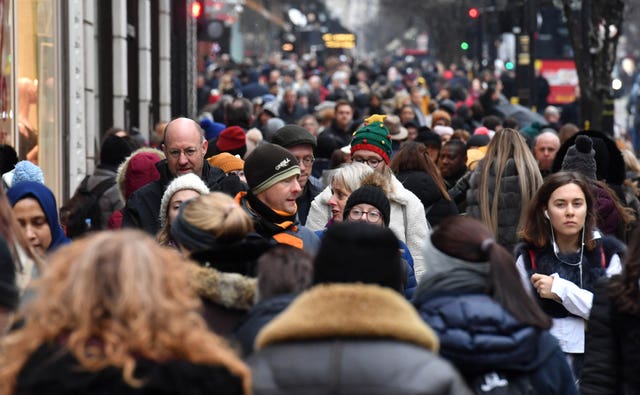
The number of Christmas shoppers heading for the high street, shopping centres and retail parks last week fell just 0.1% on the same period last year.
It may seem like good news for retailers in the age of internet shopping but analysts have warned the picture is not as rosy as it appears.
The drop comes on the back of a 7.6% decline in footfall to physical retailers in 2017, when transport disruption caused by snow and ice kept people from the shops, and a previous fall of 2.5% in 2016.
Research by retail intelligence company Springboard showed footfall was particularly weak last Saturday as parts of the country were hit by Storm Deidre.
It expects there to be an average drop in footfall over the next week of 3.5% – made up of a 3.2% fall to the high street, a 2.8% drop in retail parks and 4.8% decline in visits to shopping centres.

The firm’s researchers predicted the peak shopping day of the week to be Friday rather than Saturday, due to a pattern recorded over a number of years.
It found when Christmas falls in the first part of the week consumers generally treat the preceding weekend as part of the Christmas break and use it for family and visiting friends.
Despite Springboard’s predictions, retailers are hoping for a bumper weekend of last-minute Christmas sales.
Myf Ryan, chief marketing officer for Unibail-Rodamco-Westfield, which owns the Westfield London and Stratford City shopping centres, said: “This year, ‘super weekend’ comes immediately before Christmas Eve, representing three full days for shoppers to pick up those last-minute presents or indulge in some self-gifting.
“We predict December 22, the last Saturday before Christmas, will be our biggest shopping day of the whole year.”
Meanwhile, click and collect deliveries of online shopping to stores, secure lockers and manned collection points are expected to grow at twice the rate of home deliveries as consumers take no chances on unexpected hold-ups.
A British Retail Consortium (BRC) spokesman said: “Footfall has been declining in the UK as consumer behaviour moves increasingly online to both research products and make purchases.
“Nonetheless, with many shoppers not wanting to risk last-minute home deliveries, we can expect the shops to be very busy in the last week before Christmas as people go out to buy both food and presents.”
Elsewhere, analysis from PwC found shoppers are taking a more “virtuous” approach to Christmas this year by focusing their spending on food and children.
Shoppers will spend an average of £420 on Christmas presents this year, it found.
Although overall spending will remain similar to last year, consumers plan to focus more this year on the essentials of food and drink, Christmas dinner and children’s clothing, and less on gifts of adult clothing and electricals and technology – the two most popular categories in the Black Friday sales.
A fifth of consumers (20%) said they did most of their Christmas shopping over the Black Friday/Cyber Monday weekend, although 6% – the vast majority of them men – said they intend to buy their presents the week before Christmas.
Separate figures from VoucherCodes.co.uk and the Centre for Retail Research also suggest British households will spend an average £13 more this year on feeding the family, up to an estimated £238.
The figures come after online retailer Asos warned it experienced a “significant deterioration” in trading in the run-up to Christmas.
In an unscheduled trading update for the first three months of the financial year that, while it delivered sales growth of 14%, it “experienced a significant deterioration in the important trading month of November and conditions remain challenging”.
It has now reduced its expectations for the current financial year, expecting sales growth of 15% – down from projected figures of 20% to 25%.
Lisa Hooker, consumer markets leader at PwC, said: “2018 has been full of commentary about squeezed consumer spending and its contribution to the obvious distress on the UK high street.
“Overall, spending levels will be similar to last year but what people spend their money on may be different – it looks as though more money is being spent on the essentials – Christmas dinner, food and drink and children’s clothing.”
Kien Tan, retail strategy director at PwC, said: “With people saying they would spend more on electricals and fashion over Black Friday, it’s no surprise that those are the two categories cited as the lowest priorities for Christmas itself.
“Black Friday seems to have become the main period for indulgence, fun and self-gifting, while Christmas has reverted to its more virtuous roots.”
PwC surveyed more than 2,000 adults online in October.


Comments: Our rules
We want our comments to be a lively and valuable part of our community - a place where readers can debate and engage with the most important local issues. The ability to comment on our stories is a privilege, not a right, however, and that privilege may be withdrawn if it is abused or misused.
Please report any comments that break our rules.
Read the rules here